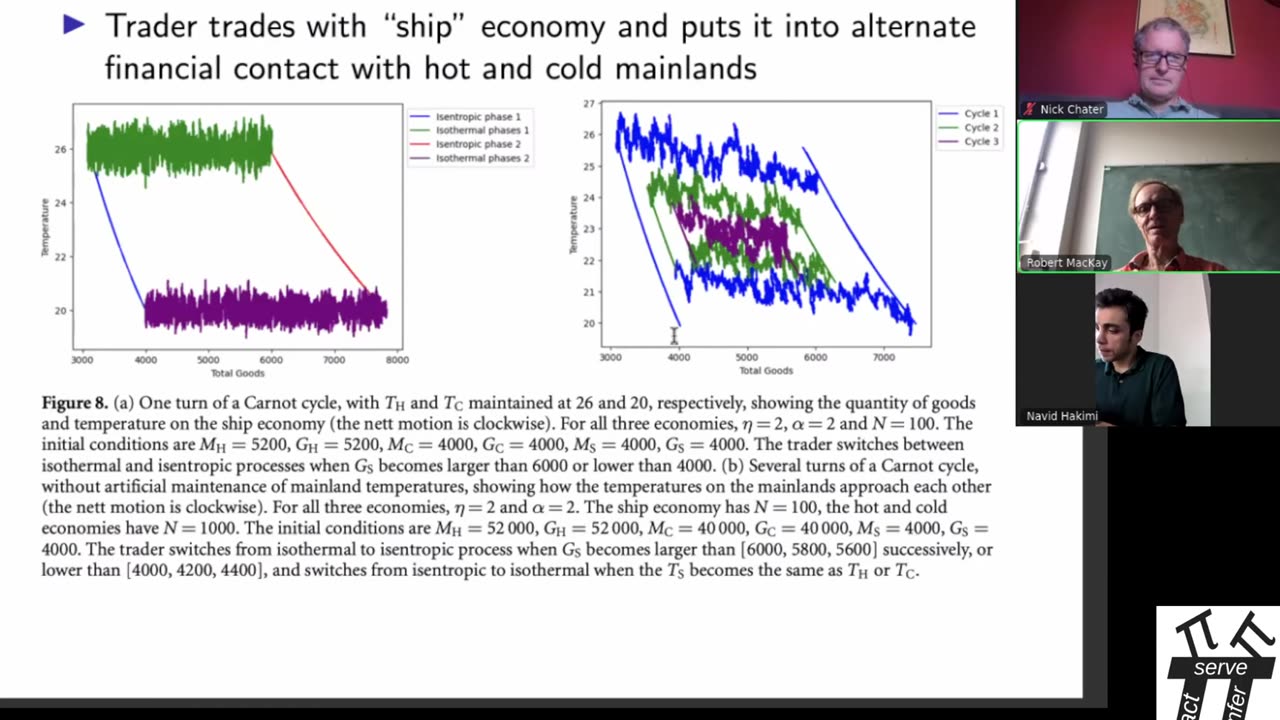Premium Only Content

ActInf GuestStream 119.1 Thermal Macroeconomics: An axiomatic theory of aggregate economic phenomena
"Thermal Macroeconomics: An axiomatic theory of aggregate economic phenomena"
Nick Chater (Warwick Business School) and Robert MacKay (Mathematics Institute, University of Warwick) (joint first authors)
Thermal Macroeconomics: An axiomatic theory of aggregate economic phenomena
N.J.Chater, R.S.MacKay
https://arxiv.org/abs/2412.00886
arXiv:2412.00886 [econ.GN]
An axiomatic approach to macroeconomics based on the mathematical structure of thermodynamics is presented. It deduces relations between aggregate properties of an economy, concerning quantities and flows of goods and money, prices and the value of money, without any recourse to microeconomic foundations about the preferences and actions of individual economic agents. The approach has three important payoffs. 1) it provides a new and solid foundation for aspects of standard macroeconomic theory such as the existence of market prices, the value of money, the meaning of inflation, the symmetry and negative-definiteness of the macro-Slutsky matrix, and the Le Chatelier-Samuelson principle, without relying on implausibly strong rationality assumptions over individual microeconomic agents. 2) the approach generates new results, including implications for money flow and trade when two or more economies are put in contact, in terms of new concepts such as economic entropy, economic temperature, goods' values and money capacity. Some of these are related to standard economic concepts (eg marginal utility of money, market prices). Yet our approach derives them at a purely macroeconomic level and gives them a meaning independent of usual restrictions. Others of the concepts, such as economic entropy and temperature, have no direct counterparts in standard economics, but they have important economic interpretations and implications, as aggregate utility and the inverse marginal aggregate utility of money, respectively. 3) this analysis promises to open up new frontiers in macroeconomics by building a bridge to ideas from non-equilibrium thermodynamics. More broadly, we hope that the economic analogue of entropy (governing the possible transitions between states of economic systems) may prove to be as fruitful for the social sciences as entropy has been in the natural sciences.
[Submitted on 13 Jun 2025]
Convergence to equilibrium for a class of exchange economies
R.S.MacKay
https://www.arxiv.org/abs/2506.11770
arXiv:2506.11770 [math.PR]
For a class of stochastic dynamical models of exchange economies that we call ``fully connected Cobb-Douglas'', the paper proves convergence of the probability distribution to an equilibrium, in total variation metric as time goes to infinity. The convergence is exponential and the equilibrium is determined uniquely by the number of agents, their ``exponents'', and the initial amounts of money and goods in the economy.
Active Inference Institute information:
Website: https://www.activeinference.institute/
Activities: https://activities.activeinference.institute/
Discord: https://discord.activeinference.institute/
Donate: http://donate.activeinference.institute/
YouTube: https://www.youtube.com/c/ActiveInference/
X: https://x.com/InferenceActive
Active Inference Livestreams: https://video.activeinference.institute/
-
 1:08:49
1:08:49
Active Inference Institute
20 days agoActInf GuestStream 082.6 ~ Robert Worden "A Unified Theory of Language"
5 -
 2:19:29
2:19:29
Badlands Media
10 hours agoDevolution Power Hour Ep. 404
58.6K26 -
 LIVE
LIVE
Drew Hernandez
23 hours agoGOP COOKED INTO DENIAL & 12 ISRAELI-LINKED PHONES DETECTED AT UVU DAY OF CK EXECUTION?
1,674 watching -
 2:46:08
2:46:08
TimcastIRL
6 hours agoFAA To STOP Flights Over Shutdown, May CLOSE Airspace, Thanksgiving Travel APOCALYPSE | Timcast IRL
180K103 -
 1:56:20
1:56:20
Tucker Carlson
6 hours agoIt’s Time to Decide: America First or Lindsey Graham’s Psychosexual Death Cult?
86.1K371 -
 LIVE
LIVE
SpartakusLIVE
8 hours agoBattlefield 6 - REDSEC || ARC Raiders Later? || Anybody Want Warzone???
504 watching -
 3:56:11
3:56:11
Alex Zedra
4 hours agoLIVE! Spooky Games tn
40.8K2 -
 2:58:21
2:58:21
I_Came_With_Fire_Podcast
15 hours agoThe Normalization of Political Violence | Right Wing In-Fighting | China Chooses China
29.8K9 -
 2:37:06
2:37:06
PandaSub2000
10 hours agoLIVE 10:30pm ET | BUZZ TRIVIA with Chat!
29.5K3 -
 1:13:58
1:13:58
ThisIsDeLaCruz
4 hours ago $0.02 earnedWhat Fans Never Hear: Pearl Jam’s Audio Engineer Tells His Story
22.1K5